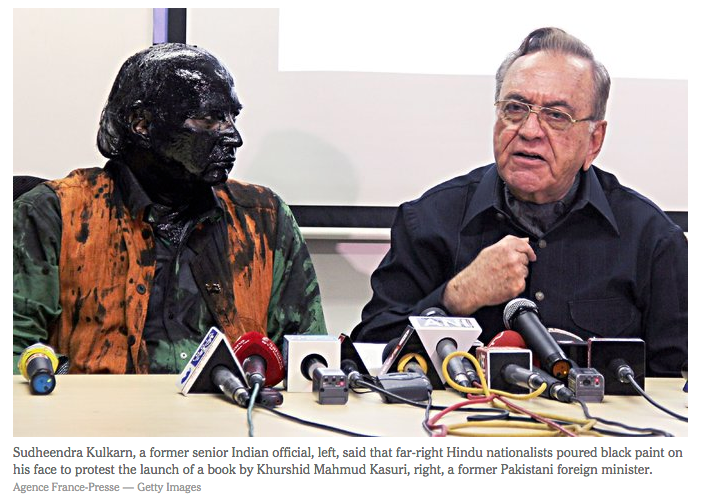Archive for Language and the media
October 20, 2015 @ 8:21 am· Filed by Mark Liberman under Language and the media
"Donald Trump and Ben Carson ask for 24-hour secret service protection", The Guardian (Reuters) 10/19/2015 [emphasis added]:
“The Department of Homeland Security has now received official requests for secret service protection from both the Carson and Trump campaigns,” spokesman SY Lee said.
The requests, if approved, would activate 24-hour protection from the two candidates, involving 260 agents, Fox News reported on Monday, citing unidentified sources.
[h/t Mark Dowson]
Permalink
October 17, 2015 @ 5:36 am· Filed by Mark Liberman under Language and the media
 David Barstow and Suhasini Raj, "India Writers Return Awards to Protest Government Silence on Violence", NYT 10/17/2015:
David Barstow and Suhasini Raj, "India Writers Return Awards to Protest Government Silence on Violence", NYT 10/17/2015:
On Tuesday, Mr. Modi for the first time directly addressed the Sept. 28 attack that left Mr. Ikhlaq dead. During an interview with the Bengali language newspaper Anandabazar Patrika, Mr. Modi called Mr. Ikhlaq’s death “really sad,” and emphasized that his Bharatiya Janata Party, or B.J.P., “never supports such incidents.”
But he also accused political opponents of trying to exploit Mr. Ikhlaq’s death. “The B.J.P. has always opposed pseudosecularism,” he said. [say what he means by pseudosecularism?] “Opposition regularly alleges B.J.P. of igniting communal flare.[flame?] But isn’t the opposition doing polarization now?”
Read the rest of this entry »
Permalink
October 16, 2015 @ 12:07 pm· Filed by Ben Zimmer under Language and politics, Language and the media, Syntax
Two years ago, I posted about a flubbed joke on Saturday Night Live's "Weekend Update," wherein Taran Killam as historical critic Jebidiah Atkinson slammed FDR's Pearl Harbor address as "a speech that was so boring-ass." The joke as originally written probably referred to a "boring-ass speech," because "[adjective]-ass" almost always occurs attributively (pre-modifying a noun or noun phrase) and not as a predicate adjective. (Acceptability judgments of the predicative use will vary, of course.)
Attributive vs. predicative use of "[adjective]-ass" is relevant again this week, after Sen. Rand Paul was captured on camera being snarky about a daylong livestreaming event his campaign was recording. Asked if he was indeed still running for President, he said:
"I don't know — wouldn't be doing this dumbass livestreaming if I weren't. So yes, I still am running for President. Get over it."
Paul told Fox News today that the comment was intended to be sarcastic. As Talking Points Memo reported,
Paul, who took flak this week for a subdued appearance in a day-long livestream video produced by his campaign, told Fox's "America's Newsroom" that he was joking when he called the exercise "dumbass."
Read the rest of this entry »
Permalink
October 16, 2015 @ 4:27 am· Filed by Geoffrey K. Pullum under Humor, Ignorance of linguistics, Language and the media, Language and the movies, Writing systems
Why won't they call in a linguist?
The producers of "Homeland," a TV spy drama, were filming a scene (shot in Berlin) in which one of the show's main characters walks through a refugee camp run by Hezbollah, and they employed a group of Arabic-speaking graffiti artists to daub the walls with authentic slogans saying "Muhammed is the greatest." (Presumably referring to the revered Arabian prophet, but sounding a bit more like an allusion to the celebrated American boxer; who knows.) But they forgot to hire a trusted Arabic-competent linguist to proofread. They had no idea what the artists had written on the set walls. It turned out to be slogans like "Homeland is not a series," "Homeland is racist," and "Homeland is rubbish." And those graffiti duly appeared on TV (whereupon the guerilla artists, not wanting their subversion to be missed, revealed what they had done).
Read the rest of this entry »
Permalink
October 14, 2015 @ 7:30 am· Filed by Mark Liberman under Headlinese, Language and the media
From Alon Lischinsky:
In "Brit noun pile heds quizzed" (3/5/2009), you wondered when did British news media start writing headlines as long, complex noun compounds.
While I have nothing resembling a clear answer, I've just noticed that it must go back to the 1930s at least. In "The Professor's Manuscript", one of the stories published in her 1939 collection In the Teeth of the Evidence, Dorothy Sayers makes what's obviously an allusion to common practice:
Mr. Egg brought his mind back—a little unwillingly— from the headlines in his morning paper ("screen star's marriage romance plane dash"—"continent comb-out for missing financier"—"country-house mystery blaze arson suspicions"—"budget income-tax remission possibility"), and wondered who Professor Pindar might be when he was at home.
Items 1, 3 and 4 in the list are perfect examples of the sort of headline you discussed in that post. If only item 2 had been “missing financier continent comb-out”…
Read the rest of this entry »
Permalink
October 10, 2015 @ 5:19 pm· Filed by Ben Zimmer under Language and sports, Language and the media, Semantics
New York Mets pitcher Jacob deGrom, who got the win in Game 1 of the National League Division Series against the L.A. Dodgers, received a glowing profile in The New York Times: "Straight Out of Hollywood: The New Guy Outpitches the Ace." When the article first appeared online this morning, it included this line, in the middle of a description of deGrom's "winding and tangled" path to the major leagues:
He also broke a finger castrating a cow, which set him back.
I don't have a screenshot of the article as it originally appeared, and NewsDiffs didn't catch it, but I found out about it on Facebook thanks to MLB historian John Thorn. Very quickly, however, the article was revised to read:
He also broke a finger castrating a calf, which set him back.
And the Times appended this wonderful correction:
An earlier version of this article misidentified the animal Jacob deGrom broke a finger castrating. It was a calf, not a cow.
Read the rest of this entry »
Permalink
October 7, 2015 @ 8:32 am· Filed by Mark Liberman under Language and the media, Linguistics in the comics
Claire Landsbaum, "Research Confirms Using Periods in Texts Makes You Seem Pissed Off", ComPlex 10/3/2015:
Before texts, every sentence ended with a period. But with the advent of impersonal electronic communication, line breaks became a quicker and easier way to express the end of a thought. "The default is to end just by stopping, with no punctuation mark at all," Mark Liberman, a professor of linguistics at the University of Pennsylvania, told The New Republic. "In that situation, choosing to add a period also adds meaning because the reader(s) need to figure out why you did it. And what they infer, plausibly enough, is something like, 'This is final, this is the end of the discussion or at least the end of what I have to contribute to it.'" In other words, because the period is a deliberate choice, including it is especially passive-aggressive.
Read the rest of this entry »
Permalink
September 4, 2015 @ 4:39 am· Filed by Geoffrey K. Pullum under Language and the media, prepositions, Prescriptivist poppycock, Style and register, Syntax
My favorite magazine is deliberately trying to annoy me. In the August 22 issue of The Economist there's a feature article about the composition of the universe (dark matter, dark energy, and all that, with a beautiful diagram showing the astoundingly tiny fraction of the material in the cosmos that includes non-dark non-hydrogen non-helium entities like us), and the sub-hed line above the title (on page 66) is this:
Of what is the universe really made?
Come on! Nobody who knows how to write natural English preposes the preposition when talking about what X is made of.
Read the rest of this entry »
Permalink
August 4, 2015 @ 8:48 am· Filed by Victor Mair under Language and politics, Language and the media, Typography, Writing systems
If you don't know who Lei Feng is, you should. He's China's equivalent of the Good Samaritan and Alfred E. Neuman ("What, me worry?") all wrapped up in one (for those of you who are not familiar with Alfred E. Neuman, one of my high school heroes, here's the real McCoy).

Read the rest of this entry »
Permalink
August 2, 2015 @ 4:49 am· Filed by Geoffrey K. Pullum under Humor, Language and the media, Morphology, Words words words
Calais in north-western France, and Kent in south-eastern England, have been experiencing weeks of extraordinary chaos. Thousands of desperate migrants from Africa and the Middle East are fighting to get into the Eurotunnel depot where they think they might be able to stow away on trucks that will make the train journey through the tunnel to the immensely desirable destination of Great Britain. The British think the Calais local authorities and the French government have been making only desultory efforts to prevent the migrants from clogging the approach roads, breaching the security fences, delaying train departures, and causing side effects like 24-hour traffic jams on the M20 freeway in Kent. So the headline writers at The Sun went to work, with feghoot based on a song from Mary Poppins:
Softy Calais goes ballistic… Frenchies are atrocious!
Read the rest of this entry »
Permalink
July 20, 2015 @ 3:46 am· Filed by Geoffrey K. Pullum under Artificial languages, Grammar, Ignorance of linguistics, Intelligibility, Language and the media, Language reform, Linguistic history, Literacy, Prescriptivist poppycock, Usage advice
Urgent bipartite action alert for The Economist: First, note that my copy of the July 18 issue did not arrive on my doormat as it should have done on Saturday morning, so I did not have my favorite magazine to read over the weekend; please investigate. And second, the guerilla actions of the person on your staff who enforces the no-split-infinitives rule (you know perfectly well who it is) have gone too far and are making you a laughing stock. Look at this sentence, from an article about Iran (page 21; thanks to Robert Ayers for pointing it out; the underlining is mine):
Nor do such hardliners believe compliance will offer much of a safeguard: Muammar Qaddafi's decision entirely to dismantle Libya's nuclear programme did not stop Western countries from helping his foes to overthrow and kill him.
Read the rest of this entry »
Permalink
July 12, 2015 @ 3:47 am· Filed by Geoffrey K. Pullum under Language and the media, passives, Rhetoric, Syntax
Those who want a clear example of truly dreadful prose, dreadful in large part because of the use of the much-loathed agentless passive, should look at examples like this, from the UK Daily Mail website on Sunday, July 12:
The medical director of NHS England has disclosed that up to one in seven hospital procedures are unnecessary, it has been reported.
Sir Bruce Keogh is said to have described waste in the health service as "profligate" and called for it to be reduced.
According to The Sunday Telegraph, the former heart surgeon estimated that up to 15% of the NHS budget is spent on treatments that should not take place.
Read the rest of this entry »
Permalink
June 10, 2015 @ 2:51 pm· Filed by Victor Mair under Classification, Language and the media
Journalists keep repeating the same bunkum about "Chinese" having 1.197 or even 1.39 billion or some other ridiculously large number of speakers. Countering a Washington Post article, I debunked this notion in "Maps and charts of the world's languages" (5/1/15).
Read the rest of this entry »
Permalink

